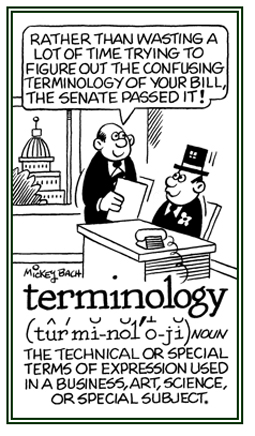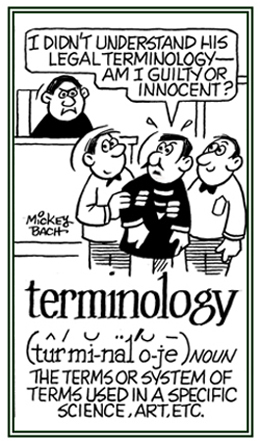term-, termin-
(Latin: end, last, final, boundary)
2. A specific length of time for something to transpire or to stop: The spring term at Brian's school is just 10 weeks long.
3. Written clauses or statements in a legal document that specify specific expectations: The terms of the mortgage were explained by Mr. Morgan, the bank manager, to the client, Mrs. Johnson.
Dr. Dickson informed Dina that the illness which she was experiencing was not a terminal illness and that she would recover.
2. The point in an electrical system where the the current enters or leaves: The electrician installed a new terminal so the lights in the house would function better.
The statue of Terminus was a stone or post which was stuck in the ground to indicate the various boundaries of the properties of those who had control over certain geographical areas; so, the Terminalia was an annual festival that was held on February 23 to honor this god.

Go to this Word A Day Revisited Index
so you can see more of Mickey Bach's cartoons.
This is a lexicon that deals with a multitude of terminologies.


Go to this Word A Day Revisited Index
so you can see more of Mickey Bach's cartoons.
Henry Thoreau in his Walden wrote about an old fence: "I sacrificed it to Vulcan, for it was past serving the god Terminus."
Waldon is the title of a book written in 1854 by Henry David Thoreau describing his two years of life alone at Walden Pond in Massachusetts.
He recounts his daily life in the woods and celebrates nature and the individual's ability to live independently of society. A famous line from the book is Thoreau's statement that "The mass of men lead lives of quiet desperation."
A few of Thoreau's views about purpose of governments
I heartily accept the motto, "That government is best which governs least"; and I should like to see it acted up to more rapidly and systematically. Carried out, it finally amounts to this, which also I believe, "That government is best which governs not at all"; and when men are prepared for it, that will be the kind of government which they will have.
Government is at best but an expedient; but most governments are usually, and all governments are sometimes, inexpedient.
The government itself, which is only the mode which the people have chosen to execute their will, is equally liable to be abused and perverted before the people can act through it.
There will never be a really free and enlightened State until the State comes to recognize the individual as a higher and independent power, from which all its own power and authority are derived, and treats him accordingly.

